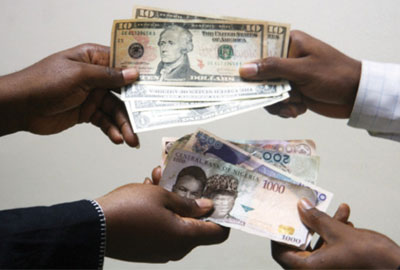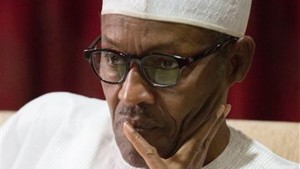Finance
Free fall:Naira depreciates further to N270/dollar in parallel market, as CBN cuts BDC supplies by 66%

By Yemie ADEOYE with Agency reports
LAGOS-THERE seems no end in sight to the ongoing abysmal fall of the Naira against the greenback as the embattled currency depreciated further to N270 per dollar at the parallel market, following reduction of dollar sales to bureaux de change (BDCs) by the Central Bank of Nigeria (CBN).
Investigation revealed that from N260 per dollar at the close of business on Tuesday, the parallel market exchange rate rose sharply to N270 per dollar in Lagos, indicating N10 depreciation.
But in Abuja, the parallel market exchange rate rose from N262 per dollar to close at N273 per dollar, indicating N11 depreciation.
BDC operators, who confirmed this development to newsmen, said that the sharp depreciation was due to further reduction in the weekly dollar sales by the CBN.
President, Association of Bureaux De Change Operators of Nigeria (ABCON), Alhaji Aminu Gwadabe told local media that though the CBN increase the number of BDCs it sold dollars to from 1,170 last week to 2,270 this week, it however reduced the amount of dollars sold to each BDC by 60 percent from $30,000 to $10,000.
According to Mr. Harrison Owoh, Chief Executive Officer, H.J Trust BDC, the decision of the CBN aggravated the demand situation in the market.
“There is huge volume of unsatisfied demand in the market. We had to turn down lots of request for dollars because of there is no dollars to sell to them”, he told Vanguard.
An Abuja based BDC operator, who spoke on condition of anonymity also told local media, “The dollar is selling at N273 in Abuja this evening. It was N262 in the morning. We are surprised at the pace of depreciation, because we can’t explain why it just went up by such margin in one day”.
Commenting on this development, Director, Corporate Communications, Central Bank of Nigeria (CBN), Ibrahim Mu’azu said that the reduction in dollar sales to BDCs is part of the demand management of the CBN in the foreign exchange market. He said that the depreciation of the naira to N270 per dollar is a speculative reaction to the development.
“The rate is not sustainable”, he said. “This is because there are still other windows for end users to buy dollars at lower rate. They can buy dollars at the official rate from the deposit money banks, and from Travelex inside the airport. So by the time people know about these alternatives, the reaction in the parallel market, and the exchange rate will calm down.”
Further investigations reveal that the naira also depreciated heavily against the British Pounds. From N365 per Pounds at the close of business last week, the parallel market exchange rate rose sharply to N385 per Pounds at the close of business yesterday.
In addition to the reduction in dollar sales by CBN, foreign exchange supply from autonomous sources is thinning due to hording. “People are hording their dollars in anticipation of further depreciation of the naira, while some are demanding higher exchange rate before they sell,” said the Abuja based BDC operator.
The anticipation of further depreciation is been driven by speculations that the reduction in dollar sales by the CBN might be followed by outright cancellation of the weekly dollar sales programme which was introduced in 2006. “The naira will hit N300 per dollar, if the CBN cancels the weekly dollar sales, projected the Abuja BDC operator.”
Recall that last week the CBN introduced revised guidelines for BDCs which tightened regulation of BDC operations. Among other things the apex bank banned BDCs from having branch directing them to close all their branches within 90 days. The new guidelines also banned BDCs from having business relationship with street currency hawkers, saying it would revoke the operating license of any BDC with business relationship with street currency hawkers.
Business
Nigeria pays US$4.9 billion on petrol subsidy in 2024- NNPCL
It was however noted by Biztellers.com.ng, that although subsidy is back in effect, the main reason for that is the increasingly weak state of the Naira and the country’s extreme dependence on products importation. Also unlike the previous subsidy era, where several oil marketers were getting free subsidy refunds for unverified product importation, this subsidy era is witnessing only one importer, the NNPCL, which in effect is the sole receiver of government subsidies.
Yemie ADEOYE
INSPITE of the official position of the Nigerian government that the controversial petrol subsidy is gone for good as announced by the President on assumption of office, the state owned Nigerian National Petroleum Corporation Limited, NNPCL has disclosed that petrol subsidy is still fully operational in Nigeria, although, under a different identity.
Umar Ajiya, Chief Financial Officer at the NNPCL, disclosed that it cost the company a staggering N7.8 trillion (US$4.9) to cover this price gap in the first seven months of 2024.
Rather than simply referring to these claims as subsidies, he stated that the company is merely managing the price difference in petrol imports on behalf of the federation, stressing that this should not be misconstrued as a return to subsidy payments.
![]() This revelation has reignited discussions on whether the NNPC is indirectly offering subsidies, a concept typically defined as selling a product below its cost price.
This revelation has reignited discussions on whether the NNPC is indirectly offering subsidies, a concept typically defined as selling a product below its cost price.
Documents reviewed by Biztellers.com.ng showed that the term “subsidy” was used extensively in official correspondence between the NNPCL and the presidency, particularly in reference to the “shortfall.”
Recall that President Bola Tinubu reportedly approved NNPC’s request to utilize the 2023 final dividends due to the federation to offset these costs.
However, during a media briefing on Monday about the company’s 2023 audited financial statements, Ajiya refuted claims that the NNPC is involved in any subsidy scheme.
Ajiya further disclosed that the Nigerian government owes the NNPC N7.8 trillion ($4.9 billion) in subsidy-related debts for the period from January to July 2024.
In furtherance of his clarification to the News Agency of Nigeria (NAN), Ajiya insisted that no subsidy payments have been made to any marketer in the last nine years, citing the NNPC’s role as the sole importer of petrol under supply contracts.
He said, “In the last eight to nine years, NNPC Ltd. has not paid anyone a dime as a subsidy; no kobo has been disbursed by NNPC Ltd. in the name of subsidy. No marketer has received any payment from us for subsidy.”
“What has been happening is that we have been importing PMS, which has been landing at a specific cost price, and the government tells us to sell it at half price. So the difference between the landing price and that half price is a shortfall.
“And the deal is between the Federation and NNPC Ltd., to reconcile, sometimes they give us money, so there is no money exchanging hands with any marketer in the name of subsidy.”
Ajiya remained silent on how much of the $4.9 billion could have been remitted to the federation account if the NNPC had not been covering the “shortfall.”
It was however noted by Biztellers.com.ng, that although subsidy is back in effect, the main reason for that is the increasingly weak state of the Naira and the country’s extreme dependence on products importation. Also unlike the previous subsidy era, where several oil marketers were getting free subsidy refunds for unverified product importation, this subsidy era is witnessing only one importer, the NNPCL, which in effect is the sole receiver of government subsidies.
Banking
CBN Denies Currency Devaluation

The Central Bank of Nigeria (CBN) has refuted claims of devaluing the.
Earlier reports suggested that the CBN had devalued the Naira, lowering its exchange rate from N631 to the dollar, compared to the previous day’s rate of N461.60 at the Importers and Exporters (I&E) window.
However, the Central Bank of Nigeria (CBN) released a statement on Thursday through its Acting Head of Corporate Communications, Dr. Isa Abdulmumin, categorizing the report as false information.
In the statement titled ‘CBN Has Not Devalued The Naira’, he said the attention of the apex bank was drawn to the news report by an Abuja based newspaper edition of June 1, 2023, titled “CB Devalues Naira To 630/51”.
However, the CBN stated categorically that the news report was replete with outright FALSEHOODS and destabilizing innuendos, ‘reflecting potentially willful ignorance of the said medium as to the workings of the Nigerian Foreign Exchange Market.’
“For the avoidance of doubt, the exchange rate at the Investors’ & Exporters (I&E) window traded this morning (June 1, 2023) at N465/USS1 and has been stable around this rate for a while.
“The public is hereby advised to ignore the news report by Daily Trust in its entirety, as it is speculative and calculated at causing panic in the market,” the CBN spokesman added.
He, therefore, advised media practitioners to verify their facts from the Central Bank of Nigeria before publishing in order not to misinform the public.
Banking
BREAKING: CBN Increases Interest Rate By 0.5%

The interest rate in Nigeria has been raised to 18.5 percent, up by 0.5 percent, from 18 percent where it was pegged in March 2023.
The Central Banks of Nigeria’s (CBN) Monetary Policy Committee (MPC) resolved to this effect at its third meeting of 2023 in Abuja, on Wednesday.
Governor, CBN, Godwin Emefiele, made the disclosure in the communiqué of the MPC’s meeting, thereafter.
While engaging the media at the end of the two-day meeting, Emefiele, said the committee voted to keep the asymmetric corridor at +100 and -700 basis points around the MPR.
In the view of the MPC, rising inflation rate is traceable to the high energy cost and challenges around the supply chain, among others, which lie outside the corridors of the CBN.
Emefiele said, “The current trend in price development would continue to be monitored by the bank with greater collaboration with fiscal authority to address the drivers of inflation.”
Biztellers reports that the CBN had effected six consecutive interest rate increases, which has seen the rate move from 11.5 percent in March 2022 to 18.5 percent in May 2023.














